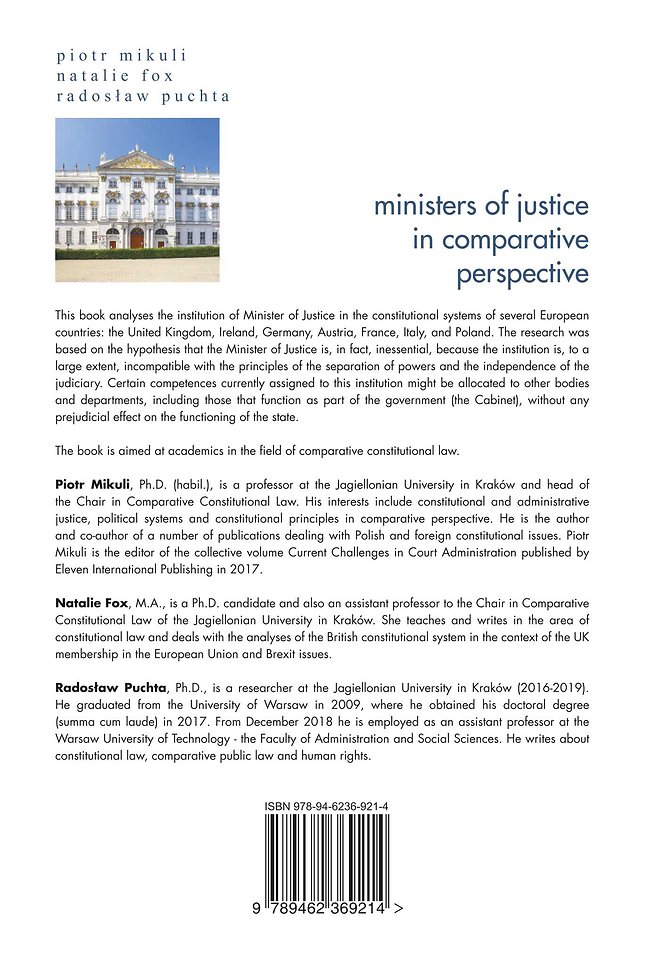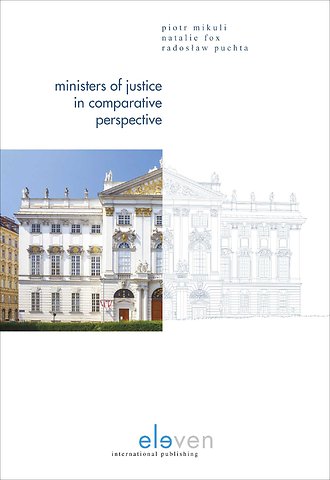



Piotr Mikuli, Ph.D. (habil.), is a professor at the Jagiellonian University in Kraków and head of the Chair in Comparative Constitutional Law.
Meer over de auteursMinisters of Justice in Comparative Perspective
Samenvatting
This book analyses the institution of Minister of Justice in the constitutional systems of several European countries: the United Kingdom, Ireland, Germany, Austria, France, Italy, and Poland. The research was based on the hypothesis that the Minister of Justice is, in fact, inessential, because the institution is to a large extent incompatible with the principles of the separation of powers and the independence of the judiciary.
Certain competences currently assigned to this institution might be allocated to other bodies and departments, including those that function as part of the government (the Cabinet), without any prejudicial effect on the functioning of the state.
This book is aimed at academics in the field of comparative constitutional law.
Specificaties
Over Natalie Fox
Over Rados?aw Puchta
Inhoudsopgave
Introduction 1
1 An Outline of the Constitutional Position of the Minister of Justice 5
1.1 General Remarks 5
1.2 Historical Outline 5
1.3 The Procedure for the Appointment and Dismissal of the Minister of Justice 21
1.4 Forms of Responsibility Assigned to the Minister of Justice and Exclusions in the Scope of Combination of Positions 30
1.5 Conclusions 32
2 The Impact of the Minister of Justice on the Court System and the Court Administration 35
2.1 General Remarks 35
2.2 The Impact of the Minister of Justice on the Court System 38
2.2.1 Determination of the Internal Organization of Courts 42
2.2.2 Determination of the Territorial Structure of Courts (Creation and Dissolution of Courts) 49
2.3 Appointment and Dismissal of the Heads of Courts 57
2.4 The Influence of the Minister of Justice on Court Administration 65
2.4.1 Court Administration Model Subordinate to the Minister of Justice 66
2.4.2 A Model of an Executive Agency Subordinate to the Minister of Justice 70
2.4.3 A Model of an Independent Agency 71
2.4.4 A Judicial-Autonomous Model 74
2.5 Conclusions 78
3 The Minister of Justice and Judges 83
3.1 General Remarks 83
3.2 Impact of the Minister of Justice on Persons Appointed to Positions of Judges 83
3.2.1 The Executive Model 84
3.2.2 The Transitive Model 85
3.2.3 The Model Including the Appointment Function of the JudicialCouncils 101
3.3 The Minister of Justice and the Disciplinary Liability of Judges 111
3.4 Influence of the Minister of Justice on the Process of Education of Candidates for Positions of Judges 114
3.5 Conclusions 121
4 Duties of the Ministers of Justice Not Directly Related to the Judiciary 123
4.1 General Remarks 123
4.2 The Minister of Justice As the Minister of Law 123
4.3 The Minister of Justice and Prosecution of Offences 129
4.3.1 The So-Called Personal Union Model 131
4.3.2 Ministerial Model 139
4.3.3 Mixed Model 147
4.3.4 The Model of Separation of the Prosecutor’s Office 158
4.4 Duties Related to the Prison System and Probation 160
4.5 Conclusions 168
Epilogue 171
Normative Acts 177
Bibliography 197





